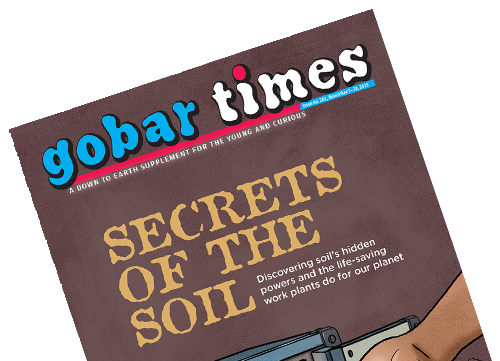
A desire for a magazine that focuses on well-identified environmental concerns and concrete tangible solutions. ************************************************************************************* It is our collective responsibility to maintain our earth as a habitable place for our present and future. Today, more than ever before, we are facing environmental challenges that can spiral into major crises unless we take urgent corrective measures. We have to strive to execute our actions points and Gobar Times provides us a wonderful platform to achieve them...

What’s the best time to eat a fruit or a veggie? Which season and for what reason? ********************************* Babbi had barely woken up and was rubbing her eyes, when she heard her mom faintly. She was calling out the names of pulses, fruits, and vegetables in the kitchen. Her dad was sitting in the next room making a list of fresh food to buy from the market. Babbi chipped in drowsily, “Papa, please get some mangoes. It's been ages since we had those,” she requested. Her dad paused and smiled...

The Yamuna River is the largest tributary of the Ganga. It travels barely a distance of 22 km through Delhi. However, this region contributes to about 80 per cent of its total pollution load. Currently, this stretch discharges waste water from almost 22 drains into the river. Untreated effluents, containing toxins and chemicals, released from houses and industries creates froth (white foam) on the river’s surface. Algae, in addition, prevents sunlight from venturing into the depths of this river. Plus, low water level in the river causes concentration of these pollutants…

To burst or not to burst?’ is a question many young humans might be asking as the patakha (firecracker) season begins. Teachers and doctors tend to advice against firecrackers but there’s always a paan-chewing uncle or a macho friend who’ll bully you kids into becoming enthusiastic arsonists. It’s usually a tough choice to make. Some additional information is always a good help in firming up ones’ resolutions. Therefore, let's throw some light on the history, chemistry, and eco-friendliness of patakhas.

Kendrapara is now a privileged district because it is the only one which hosts all three species of crocodilians found in India. Saltwater crocodiles have liked to hang around the area for some decades now. So, they are old news, nobody gets excited about them. Sort of a ghar ki murgi dal barabar situation. People get excited when new and unexpected things happen, when things happen that make us feel special. Thus, news was made in 2016 when for the first time in the history...

Stockholm Junior Water Prize (SJWP) is considered the world’s most prestigious award offered for a research project on water. It is declared every year since 1997 as a part of World Water Week. High school students, aged 15-20 years, who have developed projects solving some of the world’s most pertinent water challenges are eligible to participate in it. Each year, thousands compete in the national competitions held in almost 40 countries across the globe, and hope to represent their countries in World Water Week...

A Freedom Pledge on water—a promise to conserve every drop for our present, before we even reach the future. ************************************************************************************* My friends call me ‘Water Maniac’. They say I suffer from a ‘reverse’ hydrophobia— perennially worried about water. Basically, dreading the prospect when we won’t have any of it…

Chintu and Chinki were excited to go out for their summer vacations. They were bored of staying at home all through the lockdown. Since their grandparents lived nearby, they had planned to visit their village Tikli. Chintu and Chinki had done all their packing and rode off with their Mom and Dad to the village. As they came close to Tikli, they saw some women carrying pots of water on their heads, walking on the roadside...

